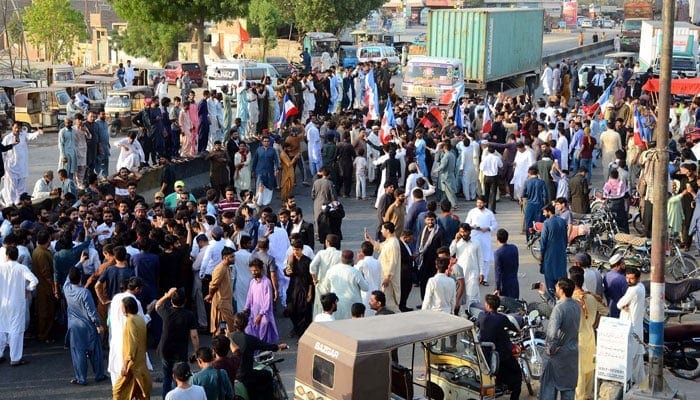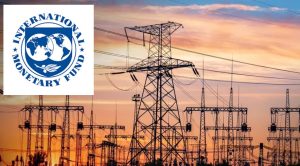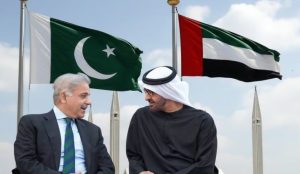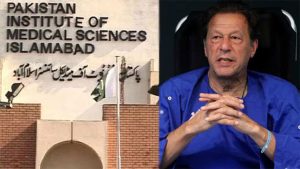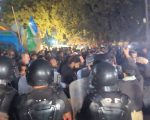SUKKAR – Protests against canal projects in Sindh have led to prolonged road blockades, stranding thousands of cargo vehicles, severely disrupting commercial activities, bringing life to a standstill, and paralysing cross-country traffic.
On Monday, the Council of Common Interests (CCI), chaired by the Prime Minister, approved the decision to end the controversial canal project from the Indus River. All four chief ministers and key officials attended the meeting and agreed to withdraw the project.
However, despite the government’s announcement, nationalist parties, lawyers, and civil society groups remain unconvinced. They have vowed to continue protests until the decision is officially implemented.
Thousands of trucks, including oil tankers and goods carriers, are stranded on key roads in Kandhkot, Kashmore, Ghotki, Sukkur, and Khairpur. The All Pakistan Goods Transport Owners Association has warned that the stranded vehicles, many carrying hazardous materials, pose serious risks of fires and explosions. They urged the government to move vehicles to safer places and restore supplies immediately.
All Pakistan Goods Transport Owners Association raises alarm
The All Pakistan Goods Transport Owners Association has appealed for immediate action to address the threats to life and property caused by the road closures.
Association President Muhammad Owais Chaudhry said that major highways and link roads had been closed due to the protests, leaving thousands of vehicles — including oil tankers, gas tankers, and coal trucks — stranded for several days.
Chaudhry warned that prolonged exposure of hazardous vehicles to the sun could cause fires, explosions, or other serious accidents. He urged authorities to move stranded vehicles to safer locations and to immediately restore the supply of essential goods and business activities.
Karachi Port Trust concerned over cargo pile-up
An official from the Karachi Port Trust (KPT) reported that export cargo is not arriving, while imported cargo is piling up at the port due to road closures in Sindh.
“We are managing the situation to avoid congestion at the port, especially with the continuous arrival of imported goods. But if the blockade continues, the port will face severe congestion,” the official warned.
Transporters added that drivers and helpers stuck on the roads are facing dire conditions. On average, each vehicle carries goods worth Rs10 million, whether for import, export, or local markets.
They also alleged that protesters had damaged dozens of parked vehicles, and over 100 sacrificial animals being transported had already died.
Representatives from the Overseas Investors Chamber of Commerce and Industry, the Oil Companies Advisory Council, and the Fertiliser Manufacturers of Pakistan Advisory Council have warned that disruptions to the supply chain are creating a severe crisis, although the OCAC representative ruled out an immediate fuel shortage despite 800–1,000 stranded oil trucks.
Police crackdown on protesters
On Sunday, Sindh police tried to disperse protesters staging sit-ins along the National, Indus, and Mehran highways. The demonstrators, opposing the construction of six new canals from the Indus River for corporate farming in Punjab’s Cholistan region, resisted police action and maintained their positions.
During operations in areas like Kandhkot, Pakka Chang, and Moro, riot police fired tear gas and baton-charged protesters, who retaliated with stone-pelting. At least 10 demonstrators were detained in Pakka Chang. Media representatives also complained of harassment, alleging that police confiscated their phones during coverage.
Political parties slam crackdown on protesters
Nationalist and opposition leaders, including Sindh Taraqi Pasand Party Chairman Dr. Qadir Magsi and Qaumi Awami Tehreek President Ayaz Latif Palijo, also criticised the crackdown and warned authorities against escalating tensions. Palijo claimed public support for the anti-canal protests exceeded that of historic movements like the MRD in the 1980s.
The Sindhu Darya Bachayo Tehreek, a key protest group, called for province-wide protests against police actions and reaffirmed that demonstrations would continue until the canal projects were officially cancelled. Convener Syed Zain Ali Shah condemned the police crackdown, asserting that force would not end the protests.
Lawyers leading the main sit-in at Babarloi bypass in Khairpur also vowed to disperse only once the government formally withdrew the canal plans.
Business sector warns of economic fallout
The Pakistan Hosiery Manufacturers & Exporters Association (PHMA) expressed deep concern over the financial losses caused by the disruption.
PHMA Chairman Abdul Hameed said thousands of export-bound containers were stuck on highways leading to Karachi Port, posing a major threat to Pakistan’s economy and potentially causing massive job losses. He appealed to the prime minister, army chief, and other leaders for immediate action to clear the blockades and protect the export sector.
Similarly, United Business Group (UBG) Patron-in-Chief SM Tanveer warned that the blockade of national highways in Sindh had severely impacted the country’s exports. He noted that Pakistan’s exports had already declined by 12% in the last quarter, partly due to logistical issues.
In his statement, Tanveer said the business community is extremely anxious, with uncertainty growing about the future.
“The current blockade is not only affecting our export targets but also damaging Pakistan’s reputation as a reliable trade partner,” he added.

